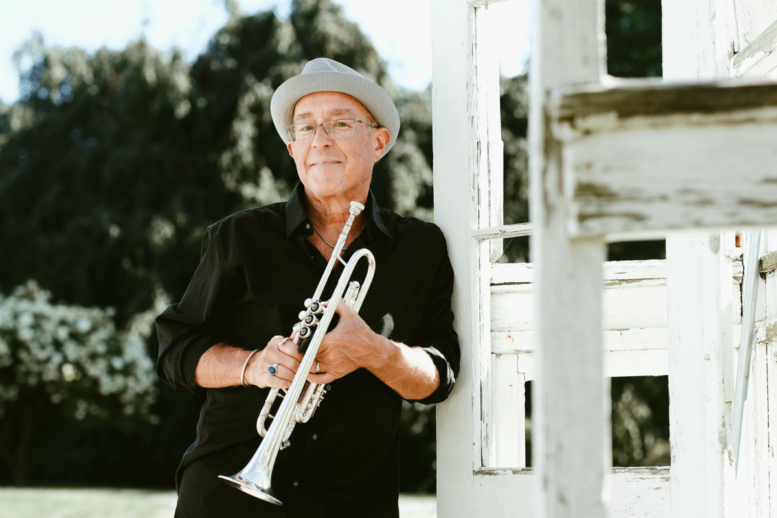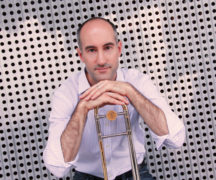By DAVID DUPONT
BG Independent News
Thirty years ago, Dave Douglas recorded his first album as a leader. “Parallel Worlds” distinguished itself because of the wide range of styles – versions of pieces by Anton Webern, Igor Stravinsky, Kurt Weill, Duke Ellington, along with his own compositions – by the unusual strings and trumpet instrumentation.
That set the pattern for the 50 or so albums that followed – each one conjures its own musical soundscape. Douglas never repeats himself. That’s true all the way to “If There Were Mountains,” inspired by haiku, released a year ago.
Douglas, jazz trumpeter, composer, bandleader, and educator, will bring that cornucopia of sound to BGSU this week as the Jazz Week guest artist.
Douglas will perform a retrospective of his work with the Jazz Faculty Ensemble – Bryan Olsheski, tenor saxophone, Ariel Kasler, guitar and piano, Jeff Halsey, bass, and Dan Piccolo, drums –Wednesday, Feb. 28, at 8 p.m. in Bryan Recital Hall. The concert is free and will be livestreamed.
On Thursday, Feb. 29, he will join the Jazz Lab Band 1 playing his arrangements, for a concert at 8 p.m. in Kobacker Hall. General admission tickets are $10. Tickets can be purchased here. This concert will also be live streamed.
Douglas will also teach a master class Thursday at 3:30 p.m. in Kobacker Hall.
“I started composing on a serious level because I had friends who also played music and I wanted us to have something fun play, something different. That sounds really simple but it’s basically at the root of all the composing I do to this day,” Douglas said.
“I like to write music, and I like to play with other musicians,” Douglas, 60, said. “The result of that is that you end up making records.” And each of those is “a different sort of vision of what this music we inherited could be.”
While he used to see himself as a progressive, “left of center” his view is shifted. “Everything I’ve done is based on the traditions that came before. Maybe I’m conservative after all.”
He deals with deep issues of theory and form that come from his intensive study of music. “But when I bear down to compose, I always have to step back and ask: ‘What is the experience for the musicians who play this going to be?’ How do I make that a positive atmosphere in which everyone can express themselves and everyone how can find something new to play every time? It boils down to: How do you write something that’s fun and challenging?”
Creating that kind of music is the focus of a course he developed for the New School in New York where he teaches. He’ll offer a compressed version of this Creative Music workshop at BGSU. “It’s going from 0-60, from having an idea, getting it on paper, learning how to rehearse it, and turning it into a real piece of music .”
Douglas’ musical roots go back to his upbringing in New Jersey. He had older siblings, two sisters and a brother, each had their own musical tastes reflected in their record collections. “I was exposed to all kind of things.”
And his father was an avocational musician who played variety instruments including banjo and piano. “I credit him for having me feel that I didn’t have to choose between the Beatles, Beethoven, and (early jazz cornetist) Bix Beiderbecke. It’s all part of a continuum.”
The most formative of the recordings was “The Smithsonian Collection of Classic Jazz.” The collection covers the music from the 1920s through mid-century bebop to the avant garde of pianist Cecil Taylor and Ornette Coleman.
“I really internalized that. It changed my life because that’s what I wanted to do,” Douglas said. He didn’t want to imitate those sounds, but the anthology helped him realized “that music could express something” and be a way to deal with ideas.
Douglas took classical piano lessons when he was young, but his predilection for improvising had already manifested itself. To the chagrin of his teacher, he never wanted to play a piece the same way twice.
His father decided that he wanted to play trombone. They idea was his son Dave would accompany him on piano. But “as soon as the trombone entered the house, it was mine there was no discussion,” Douglas said. I became a horn player that day.”
A couple years later, he switched to trumpet, because that’s the horn that carried the melody.
He attended Phillips Exeter Academy for high school. “The real saving grace of that was in my junior year I live went to school in Barcelona, Spain. I stumbled on a group of people that were playing jazz.” This was the first time he encountered his peers who listened to Weather Report and Art Blakey and were playing those tunes, and writing their own. He realized that “this is something you can do.”
He went on study at Berklee College of Music and New England Conservatory before he moved to New York City where he studied with trumpet legend Carmine Caruso. He ended up transferring all his credits and earning a degree in independent study from New York University.
He didn’t start teaching until his early 30s, when pianist Kenny Werner brought him to the Banff Center in Alberta. He was intimidated at first until he realized that the key to teaching is “listening not telling.”
Many musicians have never been asked what they want to do, Douglas said. Every musician has a different vision. The teacher‘s role is to listen for that uniqueness and facilitate its expression. “That’s the thing I find most helpful.” That’s what he’s coming to BGSU to share.


